

Science Gallery London. The SPARE PARTS exhibition features artists and designers from across the globe, informed by conversations and collaborations with leading academics and their cutting-edge research into transplantation and regeneration of the human body.
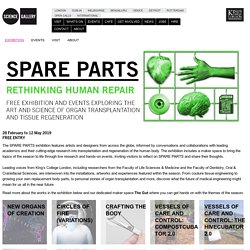
The exhibition includes a maker space to bring the topics of the season to life through live research and hands-on events, inviting visitors to reflect on SPARE PARTS and share their thoughts. Leading voices from King’s College London, including researchers from the Faculty of Life Sciences & Medicine and the Faculty of Dentistry, Oral & Craniofacial Sciences, are interwoven into the installations, artworks and experiences featured within the season. From couture tissue engineering to growing your own replacement body parts, to personal stories of organ transplantation and more, discover what the future of medical engineering might mean for us all in the near future.
JEUNES CRITIQUES D'ART. Science ouverte: adoption d'un accès ouvert obligatoire pour les publications dans 11 pays européens - Ministère de l'Enseignement supérieur, de la Recherche et de l'Innovation. Mardi 4 septembre 2018, 11 organismes nationaux de financement de la recherche, avec le soutien de la Commission européenne, dont le Conseil européen de la recherche (E.R.C.), ont annoncé le lancement de cOAlition S, une initiative visant à concrétiser l'accès libre aux publications de recherche.
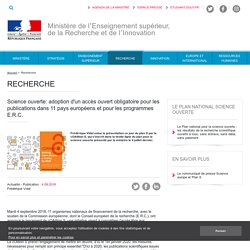
Il est construit autour du Plan S, qui comprend une cible et 10 principes, que les onze organismes formant la coalition ont convenu de mettre en œuvre de manière coordonnée. La cOlition S prend l'engagement de mettre en œuvre, d'ici le 1er janvier 2020, les mesures nécessaires pour remplir son principe essentiel:"D'ici à 2020, les publications scientifiques issues de la recherche financée par des subventions publiques nationales ou européennes devront être publiées en accès ouvert dans des revues ou sur des plateformes Open Access conformes. " Les Limites de la Connaissance - École Normale Supérieure de Lyon. Notion à la une : les communs.
Bibliographie | citer cet article | conditions de partage Le débat sur les communs se développe depuis la parution du célèbre article du biologiste américain Garrett Hardin qui, à partir de l’exemple d’un pâturage partagé, décréta la tragédie des communs (1968).
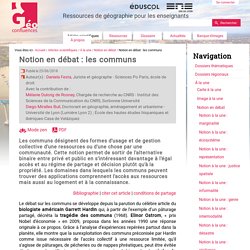
Les "communautés de vérité" de la culture numérique - Marc Jahjah. Adventures in Narrated Reality – Artists and Machine Intelligence. Writers of Writers In January, I released my code on GitHub along with a set of trained neural network models: an image captioning model and two poetic language LSTM models.
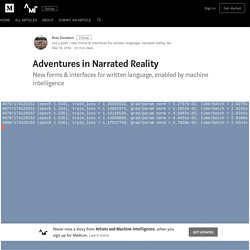
In my GitHub README, I highlighted a few results I felt were particularly strong [1,2,3,4,5]. Unlike prior versions of word.camera that mostly relied on a strong connection between the image and the output, I found that I could still enjoy the result when the image caption was totally incorrect, and there often seemed to be some other accidental (or perhaps slightly-less-than-accidental) element connecting the image to the words. I then shifted my focus to developing a new physical prototype. With the prior version of word.camera, I believed one of the most important parts of the experience was its portability. Adventures in Narrated Reality – Artists and Machine Intelligence. The Interrogators: A Novel Based on the CIA Torture Report, Written by a Machine. This is an excerpt of a 728 page 'novel' written by a fiction-generating algorithm using US Census Data and the Senate's CIA Torture Report as inputs.

For the details of its inception, see this post. While various sections have been selected for inclusion, the text itself has not been edited. On September 11, 2001, the world learned the answers to those questions that had consumed Freda Zaha and other parts of the U.S. Intelligence Community. The interrogators. Can an AI Write a Novel? Lewis Rapkin, who produced a short film based on the journey, tells me in an email that the AI “was a bit unsettling at times.”
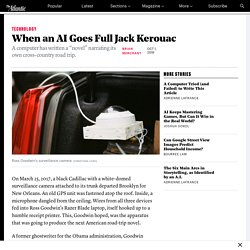
Especially early on, they all closely watched the system’s output, guessing at its meaning, its process. “Is the machine associating this abandoned factory with the history of people coming from the countryside to the city for factory work?” Rapkin says. “Is it recognizing that this is just the first story of the country, and technology is going to be the second?
Is it associating our urban blight with the Middle Ages because our country is falling apart and looks like something centuries old?” The First Novel Based on the CIA Torture Report Was Written by an Algorithm. The Senate's detailed report on the excesses and ineffectuality of the CIA's "enhanced interrogation techniques" has dominated the news cycle.
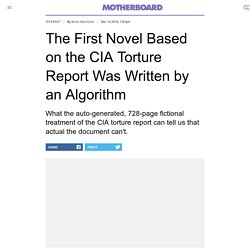
Rightfully so; the document was a gut-churning reminder of American brutality just past—a slippage towards institutionalized barbarism that most of us are still unsure how to process. Maybe a good novel would help; if only humans could write that fast. Watched! Surveillance, Art & Photography. “First of all, I know it’s all people like you.
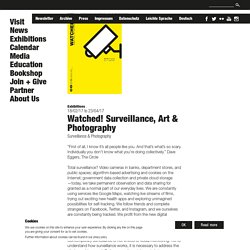
And that’s what’s so scary. Individually you don’t know what you’re doing collectively.” Dave Eggers, The Circle Total surveillance? Video cameras in banks, department stores, and public spaces; algorithm-based advertising and cookies on the Internet; government data collection and private cloud storage—today, we take permanent observation and data sharing for granted as a normal part of our everyday lives.
Contemporary surveillance is not limited to visual monitoring. The Berlin exhibition presents works by around 20 international artists who offer different commentaries on and reactions to precisely this question. Vidéosurveillance : paradigme du technosolutionnisme. La lecture du livre du sociologue Laurent Mucchielli (@lmucchielli), Vous êtes filmés !
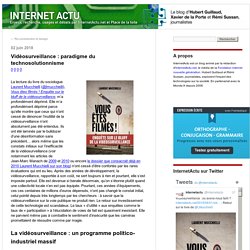
Enquête sur le bluff de la vidéosurveillance, m’a profondément déprimé. Elle m’a profondément déprimé parce qu’elle montre que ceux qui n’ont cessé de dénoncer l’inutilité de la vidéosurveillance n’ont absolument pas été entendus. Textes critiques.